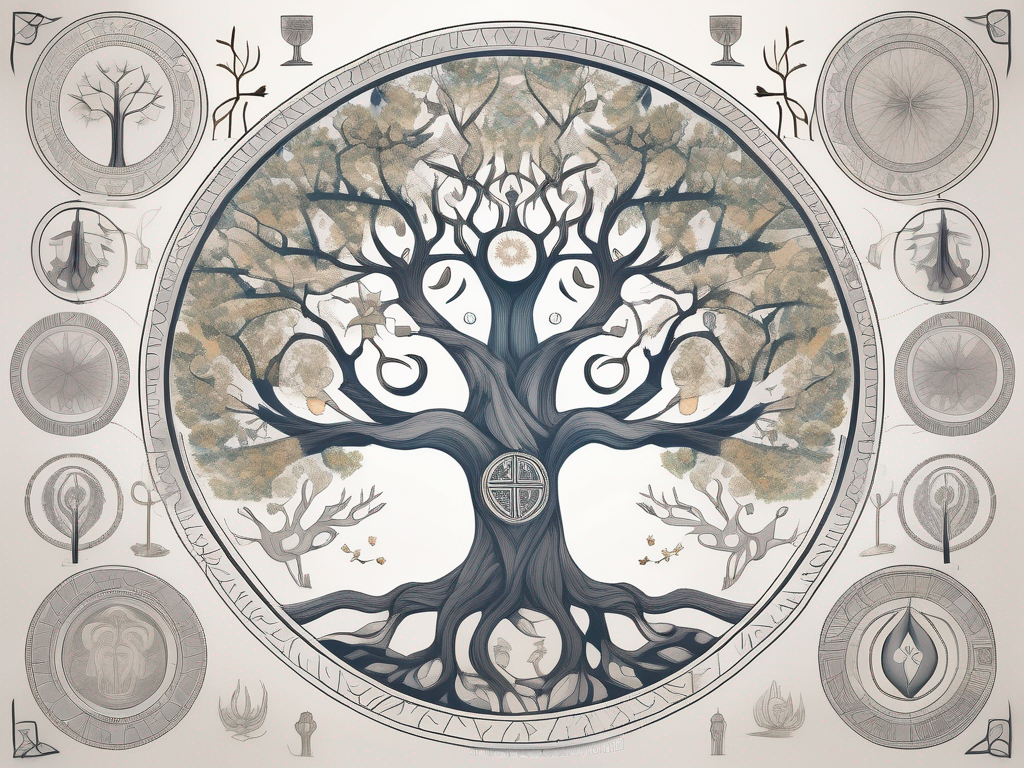Welcome to this fascinating exploration of Peitho, the Greek goddess of persuasion. In Greek mythology, Peitho played a significant role in shaping the beliefs and actions of both gods and mortals. Let’s delve deeper into the rich and captivating world of Peitho and discover the secrets behind her influence.
Understanding the Role of Peitho in Greek Mythology
In order to comprehend the significance of Peitho, it is essential to unravel her origins and lineage. Born from the union of Oceanus and Tethys, Peitho emerged as a powerful force in the pantheon of Greek deities.
The Birth and Lineage of Peitho
Peitho was one of the Oceanids, a group of nymphs who personified the various forms of water and moisture. As the daughter of Oceanus and Tethys, she inherited a divine lineage, imbuing her with immense influence and persuasive abilities.
But what exactly does it mean to personify water and moisture? The Oceanids were believed to be the daughters of the primordial Titan Oceanus, who represented the vast and unending ocean that encircled the world. Tethys, on the other hand, symbolized the nourishing and life-giving aspects of water. From this union, Peitho was born, embodying the persuasive qualities that water possesses. Just as water can shape and mold the land, Peitho had the power to shape and mold the minds of both mortals and gods.
Peitho’s very name represents her essence, as it translates to “persuasion” in Greek. This aptly reflects her captivating presence and her ability to sway even the most obstinate minds.
Peitho’s Influence on Greek Deities
Peitho’s powers of persuasion extended beyond mortals to the realm of gods. She wove her persuasive charm among the deities, often intervening in their affairs and shaping their decisions.
One example of Peitho’s influence can be seen in her role in the Trojan War. It is said that she played a crucial part in swaying Zeus’ opinion to favor the Trojans. Such was her sway that even the king of gods succumbed to her power.
But Peitho’s influence was not limited to the Trojan War alone. She was also known to have influenced other major events in Greek mythology. For instance, it is said that she played a role in convincing Aphrodite to fall in love with the mortal Adonis, leading to a tragic love story that has been immortalized in countless works of art and literature.
Furthermore, Peitho’s persuasive abilities were not limited to influencing the decisions of the gods. She also had a profound impact on mortal affairs. It is believed that she could sway the hearts and minds of individuals, making them fall in love, change their opinions, or even incite them to commit acts they would not have otherwise considered.
Peitho’s influence was so profound that she was often depicted alongside other influential deities, such as Aphrodite, the goddess of love, and Hermes, the messenger of the gods. This further emphasized her importance and the extent of her persuasive powers.
In conclusion, Peitho’s role in Greek mythology cannot be understated. As the personification of persuasion, she held immense sway over both mortals and gods. Her lineage, born from the union of Oceanus and Tethys, endowed her with divine influence and made her a force to be reckoned with. Whether shaping the outcome of wars or influencing the hearts of individuals, Peitho’s presence was felt throughout Greek mythology, leaving an indelible mark on the stories and legends of ancient Greece.
The Symbolism of Peitho in Ancient Greece
Peitho’s significance transcended her role in Greek mythology. She symbolized persuasive communication and rhetoric, both of which were highly valued in the ancient Greek society.
In the realm of ancient Greece, the art of persuasion held immense importance. It was not merely a skill, but a revered craft that could shape opinions, sway decisions, and even alter the course of history. Peitho, with her ethereal presence, personified this art, becoming an emblem of effective communication and the ability to sway opinion.
As the embodiment of persuasion, Peitho represented the power of rhetoric, highlighting the importance of well-crafted arguments and eloquent speech. Orators and politicians, seeking to inspire and influence, sought her favor in their endeavors. They understood that to truly captivate an audience, they needed to channel the essence of Peitho, mastering the art of persuasion.
Peitho as a Symbol of Persuasion and Rhetoric
Ancient Greeks regarded the art of persuasion as a vital skill. Peitho personified this art, becoming an emblem of effective communication and the ability to sway opinion.
Furthermore, she represented the power of rhetoric, highlighting the importance of well-crafted arguments and eloquent speech. Peitho was revered as a guide for orators and politicians, who sought her favor in their endeavors.
Peitho’s influence extended beyond the realm of politics and public speaking. She was a symbol of the power of words, reminding individuals of the impact their language could have on others. Whether it was a passionate plea for justice or a heartfelt expression of love, Peitho’s essence was present, urging individuals to choose their words wisely and use them to achieve their desired outcomes.
It is said that Peitho’s presence was felt not only in the grand halls of power but also in the everyday lives of the ancient Greeks. From the marketplace to the family hearth, the art of persuasion was woven into the fabric of society, and Peitho’s influence could be seen in every interaction.
The Role of Peitho in Love and Relationships
Peitho’s influence extended to matters of the heart as well. She was seen as the embodiment of persuasion in romantic relationships, where her power could bring two hearts together or mend broken bonds.
Many mythological tales feature Peitho weaving her magic to create love and passion. Whether it was uniting mortal lovers or igniting desire between gods, Peitho’s touch was often at the heart of such tales.
Peitho’s role in love and relationships went beyond mere attraction. She represented the art of seduction, the ability to captivate and enchant. Her presence was felt in the delicate dance of courtship, where words and gestures held the power to ignite flames of passion or extinguish them entirely.
It is said that those who sought Peitho’s favor in matters of love would adorn themselves with symbols of her influence. They would wear jewelry adorned with delicate feathers, a nod to Peitho’s ability to charm and persuade. They would recite poetry and engage in eloquent conversations, hoping to invoke her presence and win the hearts of their beloved.
Peitho’s influence in matters of love and relationships served as a reminder that the art of persuasion extended far beyond the realm of politics. It was a force that could shape not only the decisions of nations but also the hearts and souls of individuals.
The Worship and Cult of Peitho
Peitho’s profound impact on Greek society led to the establishment of temples and cults dedicated to her. These sacred places and religious rituals honored her as a revered deity.
Temples and Sacred Places Dedicated to Peitho
Throughout ancient Greece, numerous temples were erected in Peitho’s honor. Perhaps the most famous was the sanctuary of Peitho in Athens, where devotees sought her blessing in their persuasive endeavors.
Other notable sacred sites dedicated to Peitho included the sanctuary of Peitho near Corinth and the temple of Peitho in Argos. These places provided spaces for worship and offerings to the goddess.
Rituals and Festivals in Honor of Peitho
Various religious rituals and festivals were celebrated to honor Peitho. These events centered around persuasive arts, rhetoric, and the power of communication.
One such festival was the Peithon, held annually in Athens. During this lively event, participants engaged in debates, speeches, and competitions to demonstrate their persuasive skills, all in tribute to the goddess Peitho.
Peitho’s Representation in Art and Literature
The influence of Peitho extended beyond religious worship and rituals. Artists and authors often depicted her in their works, capturing her essence and perpetuating her legacy.
Depictions of Peitho in Ancient Greek Art
Ancient Greek art showcased Peitho in various forms. She was often portrayed as a graceful and captivating deity, adorned with symbols of persuasion and eloquence. Such depictions aimed to capture her essence and inspire mortals to partake in the art of persuasion.
References to Peitho in Classical Literature
Peitho’s presence can be found in numerous classical literary works. Authors drew upon her allure and persuasive nature to enrich their narratives and poems.
Notable references to Peitho can be found in the works of ancient Greek playwrights like Euripides and Aristophanes. These mentions serve as a testament to the lasting impact of Peitho’s role in Greek culture and storytelling.
The Modern Interpretation of Peitho
Despite the passage of time, Peitho’s legacy continues to resonate in modern times. Her influence on concepts of persuasion and rhetoric can be seen in various aspects of contemporary culture.
Peitho’s Influence on Modern Concepts of Persuasion
In our modern world, the art of persuasion and effective communication continues to play a crucial role. Peitho’s legacy serves as a reminder of the power of reasoned arguments and compelling rhetoric.
From political speeches and marketing campaigns to interpersonal relationships, Peitho’s influence can be felt in the persuasive endeavors of today.
The Legacy of Peitho in Contemporary Culture
Peitho’s enduring presence can be found in various forms of media and entertainment. The allure of persuasive characters and the art of rhetoric in movies, books, and TV shows owe a debt to the captivating force of Peitho.
Furthermore, the study of persuasion, rhetoric, and communication continues to thrive in academic institutions, keeping Peitho’s memory alive as a guiding figure in these fields.
In conclusion, Peitho, the Greek goddess of persuasion, has left an indelible mark on Greek mythology, ancient culture, and even contemporary society. Her powers of persuasion continue to awe and inspire, serving as a reminder of the enduring impact of effective communication. Unveiling the mysteries of this enchanting deity has opened our eyes to the profound significance of persuasion in human affairs throughout history.












